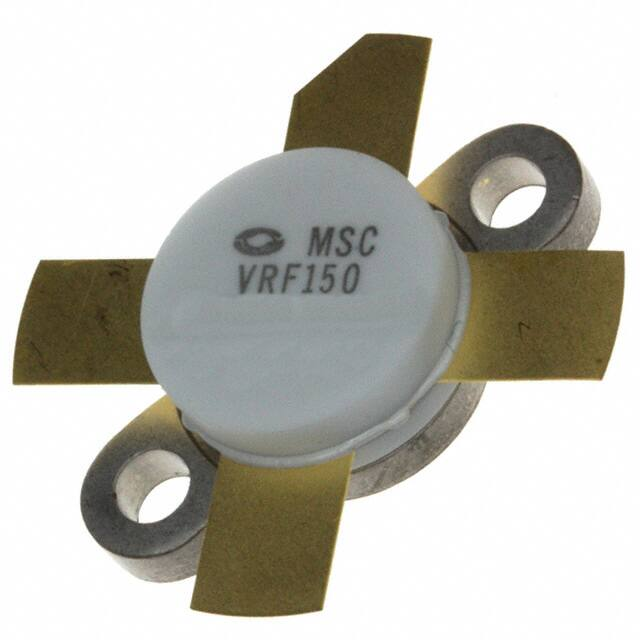VRF151
VRF151MP
50V, 150W, 175MHz
RF POWER VERTICAL MOSFET
The VRF151 is a gold-metallized silicon n-channel RF power transistor designed for broadband commercial and military applications requiring high power
and gain without compromising reliability, ruggedness, or inter-modulation
distortion.
M174
FEATURES
• Improved Ruggedness V(BR)DSS = 170V
• 30:1 Load VSWR Capability at Specified Operating Conditions
• 150W with 22dB Typical Gain @ 30MHz, 50V
• Nitride Passivated
• 150W with 14dB Typical Gain @ 175MHz, 50V
• Refractory Gold Metallization
• Excellent Stability & Low IMD
• High Voltage Replacement for MRF151
• Common Source Configuration
• RoHS Compliant
• Available in Matched Pairs
Maximum Ratings
Symbol
VDSS
ID
All Ratings: TC =25°C unless otherwise specified
Parameter
Drain-Source Voltage
VRF151(MP)
Unit
170
V
Continuous Drain Current @ TC = 25°C
16
A
VGS
Gate-Source Voltage
±40
V
PD
Total Device dissipation @ TC = 25°C
300
W
TSTG
TJ
Storage Temperature Range
-65 to 150
Operating Junction Temperature
°C
200
Static Electrical Characteristics
Symbol
Parameter
Min
Typ
V(BR)DSS
Drain-Source Breakdown Voltage (VGS = 0V, ID = 100mA)
170
180
VDS(ON)
On State Drain Voltage (ID(ON) = 10A, VGS = 10V)
2.0
Max
3.0
Unit
V
IDSS
Zero Gate Voltage Drain Current (VDS = 100V, VGS = 0V)
IGSS
Gate-Source Leakage Current (VDS = ±20V, VDS = 0V)
gfs
Forward Transconductance (VDS = 10V, ID = 5A)
5.0
VGS(TH)
Gate Threshold Voltage (VDS = 10V, ID = 100mA)
2.9
3.6
4.4
V
Min
Typ
Max
Unit
0.60
°C/W
1
mA
1.0
μA
mhos
Symbol
RθJC
Characteristic
Junction to Case Thermal Resistance
CAUTION: These Devices are Sensitive to Electrostatic Discharge. Proper Handling Procedures Should Be Followed.
Microsemi Website - http://www.microsemi.com
050-4937 Rev F 9-2010
Thermal Characteristics
�Dynamic Characteristics
Symbol
VRF151(MP)
Parameter
Test Conditions
CISS
Input Capacitance
Coss
Output Capacitance
Crss
Reverse Transfer Capacitance
Min
Typ
VGS = 0V
375
VDS = 150V
200
f = 1MHz
12
Max
Unit
pF
Functional Characteristics
Symbol
Parameter
GPS
f1 = 30MHz, f2 = 30.001MHz, VDD = 50V, IDQ = 250mA, Pout = 150WPEP
GPS
f = 175MHz, VDD = 50V, IDQ = 250mA, Pout = 150W
ηD
f 1= 30MHz, f2 = 30.001MHz, VDD = 50V, IDQ = 250mA, Pout = 150WPEP
Min
Typ
18
22
Max
dB
14
50
IMD(d3)
f1 = 30MHz, f2 = 30.001MHz, VDD = 50V, IDQ = 250mA, Pout = 150WPEP
IMD(d11)
f1 = 30MHz, f2 = 30.001MHz, VDD = 50V, IDQ = 250mA, Pout = 150WPEP
ψ
f1 = 30MHz, f2 = 30.001MHz, VDD = 50V, IDQ = 250mA, Pout = 150WPEP
30:1 VSWR - All Phase Angles
%
-30
1
Unit
dBc
-60
No Degradation in Output Power
Class A Characteristics
Symbol
Test Conditions
GPS
IMD(d3)
IMD(d9-d13)
Min
Typ
f = 30MHz, VDD = 50V, IDQ = 250mA, Pout = 150WPEP
20
f = 30MHz, VDD = 50V, IDQ(Max) = 3.75A, Pout = 150WPEP
-50
f = 30MHz, VDD = 50V, IDQ = 250mA, Pout = 150WPEP
-75
Max
dB
1. To MIL-STD-1311 Version A, test method 2204B, Two Tone, Reference Each Tone
Microsemi reserves the right to change, without notice, the specifications and information contained herein.
Typical Performance Curves
25
30
14V
10V
250μs PULSE
TEST
